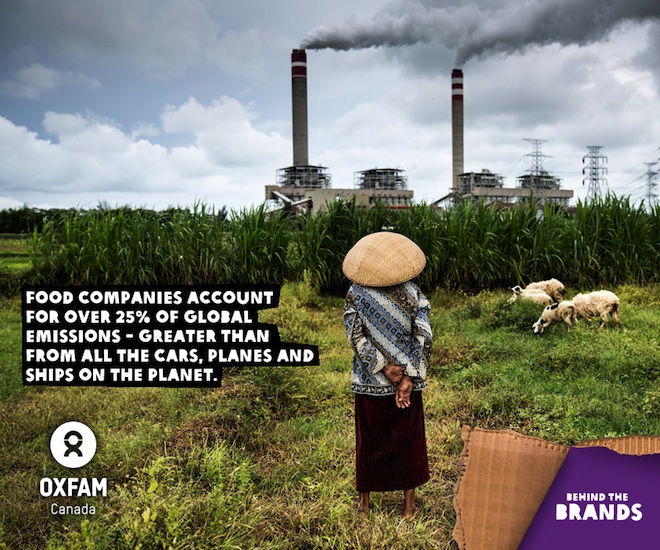4 steps food companies can take to help stop climate change
by Al Kinley
Feeding people doesn’t have to mean feeding climate change
No company is too big to listen to its customers. When enough of us speak out, companies listen. Last year more than 400,000 of you called on companies to do more for women in their supply chains. They listened. Then you spoke up about land grabs in companies’ supply chains. They listened. Now we need your voice to stand up and insist that the brands we love do more to address the single biggest threat to fighting hunger-- climate change!
By 2050, there could be an extra 25 million malnourished children under the age of 5 because of climate change, and 50 million more hungry people. Ironically, it’s not only dirty coal or the oil industry behind this; it’s also food companies. The way they grow the food that we eat is leaving people hungry and homeless. Actually a quarter of all global emissions are coming from the food system. Producing everyday items such as cereals, yogurts, ice cream and tacos, has a hefty climate footprint.
“A quarter of all global emissions are coming from the food system”
Food companies, like Kellogg and General Mills -- the creators of our favorite brands—are some of the companies being accused of things like reckless deforestation, overuse of polluting fertilizers, large scale land clearance, burning forests, and other harmful production practices in their supply chains. These are the kinds of production practices which drive dangerous climate disruptions and more hunger. For many farmers around the world this means they are not able to grow enough food to feed their families or that they are unable to make a decent living.
Check out behindthebrands.org
Spread the word on Facebook and Twitter
Around the world families like Eric Pyne in Liberia are already struggling to grow enough to feed themselves and make a living because more extreme weather events, like droughts and floods, are hitting their crops year after year. It’s just as real for Richard Oswald, from Missouri in the United States, a corn and soybean farmer whose crops are used in products sold by big food companies. His crops were destroyed by historic floods that hit Missouri in 2011. “There was nothing to harvest,” said Oswald. “We spent all the money for seed, fertilizer, herbicides and got nothing in return.”
More frequent and more extreme storms, floods, droughts and shifting weather patterns are affecting food supplies, driving up food prices and causing more hunger and poverty. It doesn’t have to be this way. Companies can cut their emissions and encourage others to do the same.
Kellogg and General Mills, stand out as among the worst of the “Big 10” when it comes to these issues. They claim to be reducing their emissions but still don’t have a plan for themselves or their suppliers to do the same. It is time for all of us to speak up and demand that companies like Kellogg and General Mills help stop climate change from making people hungry.
Together, the 10 Big Food and Beverage companies create an amazing 264 million tons of greenhouse gas emissions every year, if they were country, they would be the 25th biggest polluter on the planet, spewing more emissions than Finland, Sweden, Denmark and Norway combined.
“If the Big Food and Beverage companies were a country, they would be the 25th biggest polluter on the planet”

Agriculture emits more greenhouse gasses than all our cars, trucks, trains and airplanes combined. We think that Kellogg and General Mills can lead and help stop climate change from making people hungry starting with a few easy steps:
1. Measure Emissions
All of the Big 10 food companies, talk about climate change. But, you can’t fix what you can’t measure. We want the companies to measure and disclose their emissions.
2. Set Targets for Reducing Emissions
This one is simple. Once they know how much they are producing then they can set targets and make clear plans on how they will cut those emissions.
3. Encourage Suppliers to Act
Companies can be doing so much more. It’s not just about companies tackling their own operations but about using their influence and requiring their suppliers to do the same.
4. Act as a team and get others to act too
The Big 10 have significant power; when they speak out, it can really make a difference. Aside from cutting their own emissions they can and must call on governments and other companies to do the same.
If The ‘Big 10’ companies fail to use their power responsibly and undertake these 4 easy steps we will all suffer the consequences.
Kellogg and General Mills in particular are not doing their part. These companies should be leading the fight to help stop climate change from making people hungry. It’s time for them to act. The food we love does not have to feed climate change.
Al Kinley is Oxfam Great Britain's Digital Campaigner

